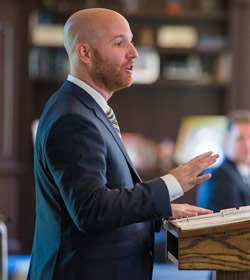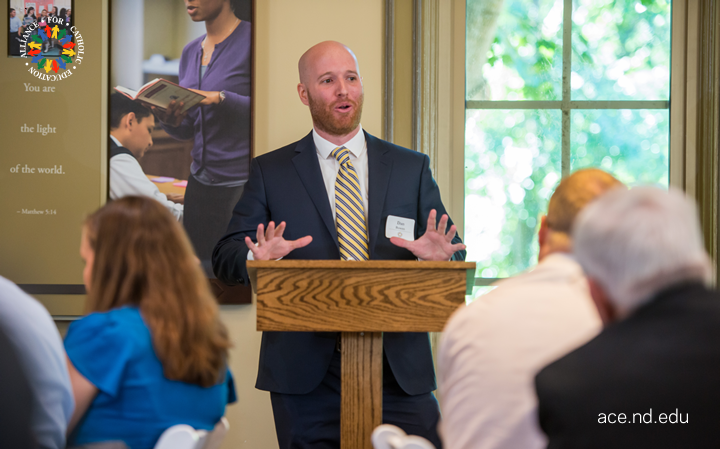Before he became an award-winning education researcher, Dan Bowen, Ph.D., was an improv coach. A middle school improv coach, to be precise.
Bowen, recent recipient of the Michael Pressley Award for a Promising Scholar in the Education Field, taught middle school social studies at Montgomery Catholic Preparatory School as an ACE 13 Teaching Fellow. His experiences beyond the classroom—coaching tennis, sponsoring student government, and directing comedy club—sparked his life-long interest in the engaging power of extracurriculars.
Coaching improv was especially formative for Bowen. When his principal asked him to direct the club, Bowen saw students who had been labeled "disruptive" in class excel in comedy, which demands dynamism and risk-taking. Bowen felt a need to explore how out-of-class activities can inspire in-class success.
 "I noticed as I was going through my graduate studies that people weren't really paying attention to the [extracurriculars] that I valued and cherished the most looking back on my teaching experience," Bowen says. "You really make different connections with students in these different areas outside the classroom—clubs and sports and extracurriculars like that—and in many cases, those are the things that students love the most in their time in school."
"I noticed as I was going through my graduate studies that people weren't really paying attention to the [extracurriculars] that I valued and cherished the most looking back on my teaching experience," Bowen says. "You really make different connections with students in these different areas outside the classroom—clubs and sports and extracurriculars like that—and in many cases, those are the things that students love the most in their time in school."
After Bowen completed a third year teaching at his ACE school, he earned his doctoral degree in Education Policy at the University of Arkansas. Since that time, he has worked at Rice University and the Houston Education Research Consortium. Now, Bowen is assistant professor of educational administration at Texas A&M University. Bowen's work has been featured in a wide array of publications, including: The Teachers College Record, The Educational Researcher, The New York Times, NBC Nightly News, CNN, The Wall Street Journal, The Atlantic, and Education Week.
Currently, Bowen also serves as the principal investigator of Houston's Arts Access Initiative, a policy designed to engage more underserved students in Houston art programs. For the past two years, Bowen has researched how these students' art program participation influences their educational outcomes. Throughout the process, Bowen has crafted professional development for teachers, coordinated field trips, and connected schools with community artists, including playwrights, Shakespearean actors, and a hip-hop group.
"You really make different connections with students in these different areas outside the classroom—clubs and sports and extracurriculars like that—and in many cases, those are the things that students love the most in their time in school."
Bowen says, "We're hoping [arts enrichment] has a huge impact on kids' engagement levels in school and the value and sense of their own creative abilities. We're hoping that those maybe translate into higher attendance rates and test scores and a whole wide range of measures."
Bowen has learned that a career in educational research is "a marathon, not a sprint." One of the difficulties of Bowen's position is that, day-to-day, the outcomes of his work are not readily visible.
"If you're in a rut and you're forgetting why you do all this work, it really helps to go see elementary school kids go on a field trip to an art museum," Bowen says. "It totally brightens your day it makes you realize what all of the work is going into."
Bowen explains that he has "so much appreciation and amazingly high praise and feelings for a lot of folks in ACE," many of whom mentored him as an educational researchers. Because he so admires the work of ACE professors, Bowen was truly honored to receive the Michael Pressley award for his own research.
Bowen's work with the Arts Access Initiative is not finished, but he already has plans to research how improv programs can increase positive academic results for students. He has contacted the famous comedy troupe Second City in Chicago, and he maintains that his time as an improv coach continues to influence his current work.
"I feel like I am who I am today because of my experiences through ACE, so I am always thankful and grateful," Bowen says. "It's just a really great feeling to know that I have gone down a path that isn't in the K-12 classroom any more, but still is hopefully serving the greater mission of ACE."
 Alliance for Catholic Education
Alliance for Catholic Education
